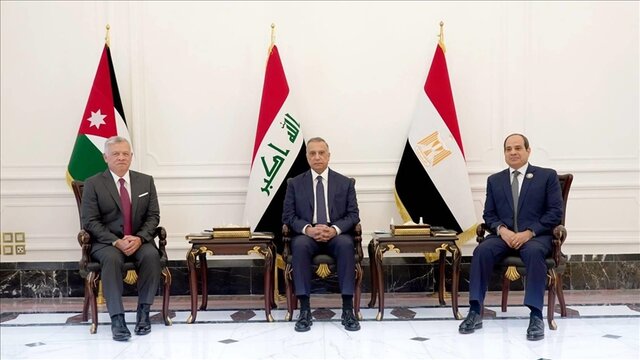Seyed Reza Qazvini Gharabi, speaking in an interview with the website of the Strategic Council on Foreign Relations, stated that the project known as the “New Levant” is in fact a project that began during the tenure of Haider al-Abadi, the former Iraqi Prime Minister, adding: The first round of high-level meetings for this plan began in 2019 during the term of Adel Abdul Mahdi; therefore, it cannot be considered as a special project of Al-Kazemi; although such a labeling was made by him for the first time and is clearly followed more seriously in his time.
He added: This project is specifically focused on economic cooperation among the three countries; the Iraqis sell cheap oil to Jordan and Egypt, use Egypt’s ability to refine oil and export it to Europe, and Egypt and Jordan help Iraq with energy and electricity, in addition Egypt will specifically undertake to rebuild the Sunni areas damaged by the ISIS.
Characteristics of tripartite Iraq, Jordan and Egypt cooperation
Regarding the characteristics and necessities of this cooperation for those three countries, the expert on Iraq affairs said: Assessing the interests of each of the three countries in this project and the contributions of each of them, requires a thorough examination of all explicit and implicit aspects of the agreements. Relatively poor Jordan and Egypt will use cheap Iraqi oil at 16 dollars a barrel. Egypt is supplying its electricity overflow to Iraq through Jordan, and will specifically undertake reconstruction of the damaged areas in Iraq, which also happened to be of interest to Iran.
Qazvini continued: Iraq will also strengthen its relations with the Arab periphery by strengthening its relations with the two Arab countries, especially Egypt, and may even use the experiences and training of the two countries militarily.
Saying that Jordan and Egypt are two allies of the United States, and such a relationship and agreement will also be endorsed by Washington, he said: We saw the US State Department spokesman welcomed the signing of that agreement. In any case, if in the economic field, Egypt becomes a serious partner for Iraq in the field of electricity supply and reconstruction, it will mean the entry of a serious competitor for Iran in the Iraqi market.
Referring to the remarks of an Iraqi representative that regarding the relations between Jordan and Egypt with the Zionist regime, this project will be a ground for normalization of relations with the Zionist regime, Qazvini clarified: The issue of normalization of Iraq’s relations with the Zionist regime is a more complicated issue than the agreement. There are currently strong economic incentives for those parties. Incidentally, among the three countries, Jordan and Egypt need to have relations with Iraq much more than Iraq to relations with them.
Commenting over the internal situation in Iraq, the researcher on Iraq affairs said: Considering issues such as the activities of resistance groups in Iraq or playing a prominent role in the religious authority, which is very sensitive to the issue of Palestine and Holy Quds; it should be noted that the Iraqi domestic environment is concerned with the political developments in the region, and in addition, the foreign policy framework is not exclusively at the disposal of the Prime Minister, who wants to make changes in some principled policies.
The expert on Iraq affairs added: At the same time, the results of the Iraqi elections and the approach of the new government can be effective in looking at the agreement and the trilateral relations and their overt and covert objectives.
According to Qazvini Gharabi, given the conditions in the region, if this tripartite agreement seeks to create a strong axis, it will not be very likely, and any hidden political approach in this agreement can be considered as a serious obstacle to its success and continuation.
He continued by emphasizing the need to clarify the overt and covert dimensions of this agreement, adding: it must be determined basically what tangible achievements Iraq will have through this agreement and its relationship with Egypt and Jordan within its framework. It needs to be clarified what the real benefit of Iraq will be with the 16 dollars per barrel oil agreed with Jordan and Egypt, and whether Iraq has come under pressure from the designers of the “New Levant” project; because the principles of this project were first proposed by the International Monetary Fund in 2014 in the government of Mr. Haider al-Abadi.
Qazvini Gharabi referred to the clauses of the final statement of the recent summit of the three countries and commenting on some analysis that have made the creation of this space comparable to the time of the formation of the European Union, said: Certainly, such relations cannot be compared with the European countries. The conditions for the establishment of the European Union and the socio-political situation of that continent are very different from those of West Asia. In the case of the Persian Gulf Cooperation Council, for example, a few years ago it got to the point where a dispute between Qatar and other members of the Council led to the severance of relations between the country and the Council.










0 Comments